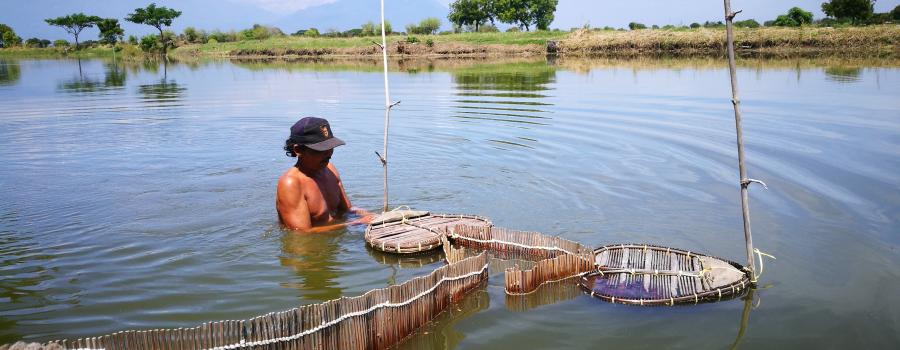Inclusive Supply Chains and Continuous Improvement

In many major and upcoming countries of production, there are large (vertically integrated) operators but also smaller farmers growing shrimp. Global shrimp supply chains depend to a certain extent on the supply of raw materials from these smaller producers. Primary processors are sourcing - long term or on the spot market - from these small producers to meet market demand. Such supply from smaller producers needs to meet the specifications from buyers, volumes are smaller and prices are volatile. Including smaller operators in international supply chains requires investment in relationships, planning and logistics, infrastructure and capacity building. This seminar will look into how the industry can deal with such challenges? Furthermore we will address the trends and opportunities to make supply chains more inclusive.
India is the world’s third-largest exporter of shrimp, and Andra Pradesh produces almost 70 percent of the country’s farmed shrimp. Stakeholders are negotiating an agreement to improve the production of whiteleg shrimp to a level consistent with a Seafood Watch yellow rating by 2025. The collaborators intend to improve environmental performance as well as social and economic well-being. Central to this work is the Improvement Verification Platform, or IVP. The IVP is a web-based app to quickly collect data from farms and surrounding areas using a series of interactive and interdependent questions. This new platform helps to take a regional approach to data collection, farm improvements and sustainability assurance.
Speaker: Wendy Norden, Director of Science, Monterey Bay Aquarium
Under the support of ISEAL, the ASC and SFP, Yayasan Sustain Aqua Indonesia (YSAI) is implementing an Aquaculture Improvement Project (AIP) with 24 shrimp farms and two processors in East Java, Indonesia. The AIP has strong engagement and ownership of local stakeholders, especially around the management and improvement of water quality. YSAI, in collaboration with the processors involved, delivers capacity building services for the shrimp farmers and will measure and report on baseline performance and progress over time. By doing so, YSAI will build credibility for the AIP by providing transparency on its performance. YSAI will share lessons learned on identifying farmers’ needs and convening local stakeholders around a common improvement agenda.
Speaker: Retno Nuraini, Program Manager, Yayasan Sustainaqua Indonesia
The Sustainable Shrimp Partnership (SSP) aims to shape a sustainable future for the shrimp industry by driving accountability, transparency, inclusion and progressive leadership. In order to achieve that vision, engaging small and medium-sized farms in working towards the highest levels of environmental and social performance is key. By including more farms and regions into the program, the SSP aims to raise the performance of the sector as a whole. In this session, SSP will share learnings and insights from their Scale Up Programme, which engages with smaller producers and supports them in addressing key environmental and social impacts.
Speaker: Maria Fernanda Vilches, Process Manager, Sustainable Shrimp Partnership
Panelists review their experience from across the globe, comparing some of the challenges and successes from producer, packer and exporter perspectives with those from NGOs. How have farmers been successfully engaged and what are the remaining challenges? What has worked, what hasn’t? Who should be taking the lead in future initiatives?
Panellists:
Wendy Norden, Director of Science, Monterey Bay Aquarium
Maria Fernanda Vilches, Process Manager, Sustainable Shrimp Partnership
Retno Nuraini, Program Manager, Yayasan Sustainaqua Indonesia
Dominique Gautier, Director of Sustainability, Seafresh Group
Aris Utama, Director, PT Bumi Menara Internusa
Moderated by: Anton Immink
Contrary to the improvement space in fisheries, there is no agreed upon definition of Aquaculture Improvement Projects (AIP). Various approaches have been tested over time, but the lack of a clear framework has led to a lack of engagement by the private sector into AIPs. Through its Improver Programme, the ASC is putting forward a framework for AIPs which builds upon the foundational elements of the ASC: credibility through transparency and performance. The Programme is a non-competitive effort to equip the industry with a tool to drive engagement and further uptake of improvements at scale.
Speaker: Roy van Daatselaar, Global Lead Improver Program, Aquaculture Stewardship Council
XpertSea is a technology company bringing trust, transparency and productivity to aquaculture while incentivizing and enabling sustainable production. XpertSea’s AI-powered innovations help shrimp farmers in countries across the world access richer and more accurate data to improve productivity and achieve better financial outcomes. As demand for sustainable protein grows, XpertSea works to align farming practices with international demand for responsibly-sourced seafood so that we may build a more transparent, profitable and sustainable supply chain for the global shrimp market.
Speaker: Roxanne Nanninga, Chief Sustainability Officer, Xpertsea
The Fishin’ Company are members of several pre-competitive, multi-stakeholder platforms aiming to support improvements in aquaculture. These platforms cover a range of ambitions, from moving more farms into certification (e.g. GSSI), through to landscape/jurisdictional improvements around disease or environmental quality (e.g. Farmed Shrimp Supply Chain Roundtable), and to engaging policy makers to drive wider institutional change (e.g. Seafood Task Force). Justin will discuss the reasons for participation in these fora and the contribution importers (and other supply chain actors) make to support improvement.
Speaker: Justin Baugh, Director of Sustainability and Traceability, Fishin' Company
We will explore what inclusive models can scale improvement, through engagement of governments and wider supply chains. We will ask what additional actions are needed to address emerging issues and what a responsible supply chain model could look like.
Panellists
Roy van Daatselaar, Global Lead Improver Programme, ASC
Roxanne Nanninga, Chief Sustainability Officer, Xpertsea
Lisa van Wageningen, Program Manager Aquaculture, Sustainable Trade Initiative
Justin Baugh, Director of Sustainability and Traceability, Fishin' Company
Dane Klinger, Aquaculture Director, Conservation International
Moderated by Anton Immink